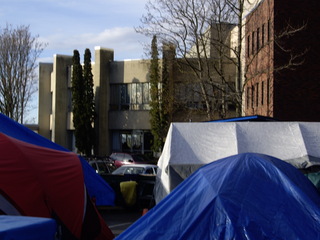A Look Inside Tent City 3 at St. Mark's Cathedral
By Devan Schwartz
April 28, 2009
Lantz Rowland knows very well the inner working of both the camp and the umbrella organization. Maybe for this reason, or maybe because he’s been asked about it before, he likes to clarify how the camp remains independent and autonomous. “All of our meetings, all of our staff is self-managed, that’s how we keep the cost down,” he said.
Tent City 3’s funding comes mainly from private donations, save a modest grant from the Federal Emergency Management Administration. They are ineligible to receive most other government funding, including any contributions the City of Seattle makes to SHARE and WHEEL.
Perhaps as an outgrowth of this situation, Tent City 3 has become a cost-effective model, taking only around $4,400 a month to operate, according to organizers. This breaks down to anywhere between two and four dollars per bed per night, depending on the current population. And by many metrics it is also a better deal for its residents than some of the more expensive indoor shelters in King County.
“Tent City 3 is 24/7, so we’ve got people who work swing shifts and graveyard shifts,” says Rowland. “Which you can’t do at an indoor shelter–that’s a huge difference.”
Most of the indoor shelters have rules on entry and exit time. The Seattle Union Gospel Mission shelters, for example, have designated times when residents must be out for cleaning - the first one around 5 a.m. This makes it difficult for someone trying to work at night and sleep during the daytime. Though the SHARE/WHEEL indoor shelters vary on entry/exit times, they’re all generally between 6:30-9:30 p.m. and 6:00-8:30 a.m.
Tent City 3 is a place that provides different things for different people. Nicholas McLean explains his own situation prior to becoming a camper there: “I was on the streets, I was injured, out of work, couldn’t do work, didn’t have any other place to go.”
He says that the resources of the tent city helped him to start receiving disability payments and get on the list for eventual low-income housing.
“If I wouldn’t have had a place to stay I wouldn’t have gotten help,” McLean said. “For me this is a place to wait for my housing. I’m on the list for housing. It’s a long wait. I’ve been told it’s six months to a year I’ll have to wait.”
For others, it might be as basic as having a place to put their possessions, rather than taking it with them wherever they go. “Your stuff’s in your tent, your tent’s protected by your neighbors,” Rowland said. “It’s a community, we protect each other.”
Walking around the makeshift hallways between the folding chairs and the tents resting on their pallets, you can feel both an admirable and pragmatic focus on residents’ basic needs. Donations come in the form of hot meals, paper plates, rolls of garbage bags or shoes. Campers accrue required ’community points’ by attending meetings or doing security patrols, reporting any prowlers in a three-block radius.
St. Mark’s has been a gracious host, donating electricity and water to the tent city, and helping to integrate them into the community, hosting workshops for parents on how to educate their children about homelessness. A local daycare even took a tour inside the camp’s makeshift walls.
Tent City 3 has since moved to the Cherry Hill Baptist Church, where they will stay for seven weeks. During that time they will immediately seek out their next host. The inevitable relocation of the tent city remains one of the few constants in the lives of the campers, a reliable financial and logistical burden.
Each move requires renting trucks, making a run to the trash dump, and emptying the portable toilets. It takes a very full, exhausting day to move the camp and about three days on either to side to pack up and get resettled. All told, the moves usually cost around $1,100, or a quarter of the total operating cost per month.
But now that Capitol Hill’s temporary neighbors have left, hopefully they will not be forgotten. And perhaps local businesses and private residents will even recall the sense of community, the stability and security that is Tent City 3 when they are asked in the fall to make a donation to the annual Harvest Auction fundraiser.


